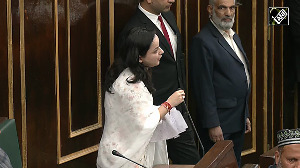Telephone any senior private bank executive. In all likelihood, you will notice that he is somewhere in the rural hinterland.
That's because the new private banks (HDFC Bank, UTI Bank and IDBI Bank) have started granting loans to farmers based on the quality of their produce and warehouse receipts, with the crop (wheat, potatoes, cotton or sugarcane) as collateral.
A report on the quality of produce is prepared either by the bank itself or an independent agency the bank appoints. For perishable products, agency reports are time-bound.
A warehouse receipt is a document guaranteeing the existence and availability of a given quantity and quality of a commodity in storage for safekeeping, which is often used in cash and futures transactions.
The interest rates the banks charge vary between 8 per cent and 10 per cent, lower than bank prime lending rates. For loans up to Rs 50,000, the interest rates are at least two percentage points below the PLR. For loans up to Rs 200,000, the rates are either marginally below the prime rate, or equal to it.
Banks are also providing the facility of converting overdues into a term loan if a farmer is unable to repay a loan owing to unforeseen calamities.
HDFC Bank has been exploring alternative channels of direct and indirect farm lending, said HDFC Bank's country head, corporate banking, Samir Bhatia.
The bank recently extended credit to farmers on the guarantee of warehouse receipts and an inspection report prepared by an agency appointed by the bank. The bank has extended a line of credit against commodities like mustard, castor, soyabeans, sunflower, spices and jeera.
UTI Bank ran a pilot project in places like Guntur and Kochi, and has disbursed approximately Rs 5 crore (Rs 50 million) in these places, UTI Bank's head of credit R Asok Kumar said.
"The loan recovery rate has been 100 per cent. Hence, we plan to explore this area of financing further," he added. To be sure, public sector banks led by the State Bank of India, have traditionally been offering loans to farmers on a group guarantee basis.
In the case of a group guarantee, all members of a group, which takes the bank loan offer, guarantees that the loans will be repaid by each and every member.
Banks accept the receipts of authorised agencies like the Central Warehousing Corporation, state warehousing corporations and private warehouses.
Though warehouse receipt financing is a traditional product, it has not gained momentum on account of poor infrastructure.
The credibility of the warehouse receipt and the absence of a spot market for commodities are the major stumbling blocks, said HDFC Bank's vice-president and head, capital market and corresponding banking services, PV Ananthakrishnan.
IDBI Bank's head of credit administration Rajiv Handa said though this market had yet to evolve, the measures taken by the National Commodities and Derivatives Exchange India (NCDEX) are a move in the right direction.
NCDEX has tied up with a Geneva-based company, ACE (a collateral management company), to help develop a commodity financing structure, said NCDEX's chief of strategic initiatives, A Hari Prasad.
The organisation has also accredited certain warehouses based on quality. It is working with rating agency Crisil to build a rating model for warehouses.
The organisation has a tie-up with the National Securities Depository Ltd and eight banks to facilitate the dematerialisation of warehouse receipts, that will help minimise the possibility of forgery.






 © 2025
© 2025